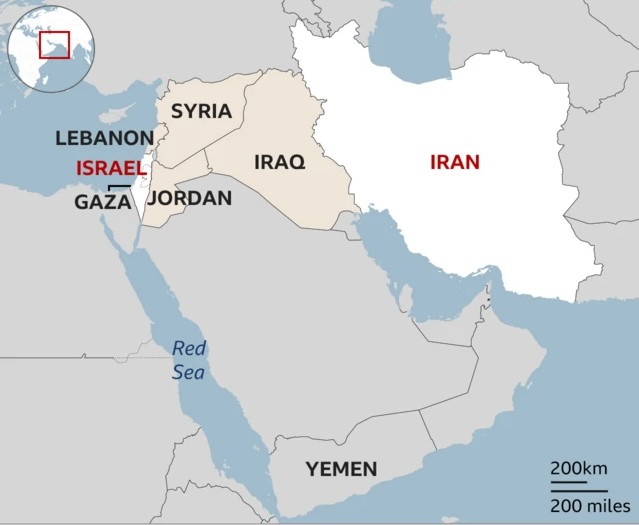
Middle East on Edge: Israeli Attack Warnings Fuel Escalation with Iran
Nuclear Alarms Sound as Diplomatic Efforts Intensify Amidst Threats and Military Posturing in a Volatile Region.
by Anne Martin 13 June 2025
The geopolitical landscape of the Middle East is currently experiencing a heightened state of alert, driven by stark warnings and strategic maneuvers between Israel and Iran. Speculation regarding a potential Israeli military strike against Iranian nuclear facilities has surged, with various U.S. media outlets citing intelligence sources suggesting such an attack could occur within days. This immediate tension is compounded by direct threats from Tehran and cautious diplomatic signals from Washington, placing the region at a precarious crossroads.
Immediate Tensions and Warnings
Reports from prominent American news organizations indicate that intelligence communities are increasingly convinced of a possible Israeli pre-emptive strike on Iranian nuclear centers. This assessment is contributing to a palpable sense of apprehension across the Middle East. In response, Tehran has unequivocally stated that it has received warnings of a potential attack from a “friendly country.” Demonstrating its readiness to retaliate, Iranian officials have threatened an “immediate launch of ballistic missiles” targeting both Israel and U.S. military bases throughout the region should an Israeli raid materialize.
The United States has reacted to this escalating rhetoric by implementing cautionary measures, including ordering the “orderly evacuation” of personnel from some diplomatic missions in the Middle East and advising military families to depart. Iran, interpreting these American withdrawals, has provocatively declared them not as a sign of imminent threat, but rather as a direct response to Iran’s own assertive posture and warnings.
The Nuclear Impasse and International Scrutiny
Fueling the current crisis is the persistent concern over Iran’s nuclear program. The United Nations’ atomic energy watchdog, the International Atomic Energy Agency (IAEA), has issued a forceful denunciation, declaring Tehran in non-compliance with its nuclear obligations. Critically, the IAEA warns that Iran now possesses enough enriched uranium to potentially arm ten nuclear warheads, though it would require additional time to fully develop and deploy such capabilities. This explicit warning from a neutral international body intensifies global non-proliferation anxieties.
Tehran has swiftly rebuffed the IAEA’s stance, labeling it as “politically motivated” and vowing to further increase its uranium enrichment activities. In a display of defiance and preparedness, Iran has also announced upcoming military exercises aimed at bolstering its “defense and deterrence capabilities,” with a stated focus on anticipating and countering “enemy movements.” Echoing international concerns, Israel’s Foreign Minister has urged the global community to “respond decisively” to Iran’s continued non-compliance, emphasizing that it poses an imminent threat to regional and international security and stability, as well as the global non-proliferation regime itself.
U.S. Stance and Diplomatic Tightrope
The United States, through President Donald Trump, has delivered a complex message amidst the brewing tensions. Trump acknowledged the very real possibility of an Israeli attack, stating that it “could really happen.” Yet, he simultaneously urged Israel against taking military action, suggesting that a diplomatic agreement with Tehran is “close.” This seemingly contradictory stance reflects the precarious balance Washington attempts to maintain in the region. Despite expressing diminishing confidence that Tehran will ultimately agree to cease uranium enrichment, President Trump issued a stark warning of a potential “massive conflict” should “something… happen, and soon.”
In a critical diplomatic effort to de-escalate the situation, negotiators representing President Trump and emissaries from Tehran are scheduled to convene in Oman over the upcoming weekend, marking another attempt to forge a desperately needed agreement. The outcome of these high-stakes discussions will be crucial in determining the immediate trajectory of the crisis.
Israel’s Internal Challenges and Broader Strategic Calculus
For Israeli Prime Minister Benjamin Netanyahu, preventing Iran from acquiring nuclear weapons has long been articulated as an “existential mission,” a paramount security objective for the state of Israel. This overarching strategic imperative now unfolds against a backdrop of significant domestic political challenges. Netanyahu recently navigated a challenging day in parliament, narrowly surviving a no-confidence motion, which highlights the ongoing internal battles for his political survival as Israel’s longest-serving head of government.
Compounding these internal pressures is the demand for a new law addressing military exemptions for ultra-Orthodox rabbinical students, a sensitive issue that divides his ruling coalition and even his own Likud party, particularly as the rest of the Israeli populace is deeply engaged in the ongoing Gaza conflict. This war, initiated after the October 7, 2023, Hamas massacres, is Israel’s longest since its independence and continuously requires more military personnel. The possibility of an escalation with Iran looms as a terrifying prospect, potentially opening “another, even more complex front” for Israel in an already challenging security environment.
Outlook for Regional Stability
The confluence of heightened rhetoric, advanced nuclear capabilities, and the presence of external actors creates an extremely volatile environment in the Middle East. The delicate balance between deterrence and provocation is constantly tested, with the risk of miscalculation ever present. As diplomatic channels remain open, albeit strained, the world watches to see whether the path to a peaceful resolution can be found, or if the region will be drawn into a wider, more devastating confrontation.
#Geopolitics #MiddleEastCrisis #IsraelIranConflict #NuclearProliferation #RegionalSecurity #InternationalDiplomacy #MilitaryEscalation #USForeignPolicy #IranNuclearDeal #GlobalStability